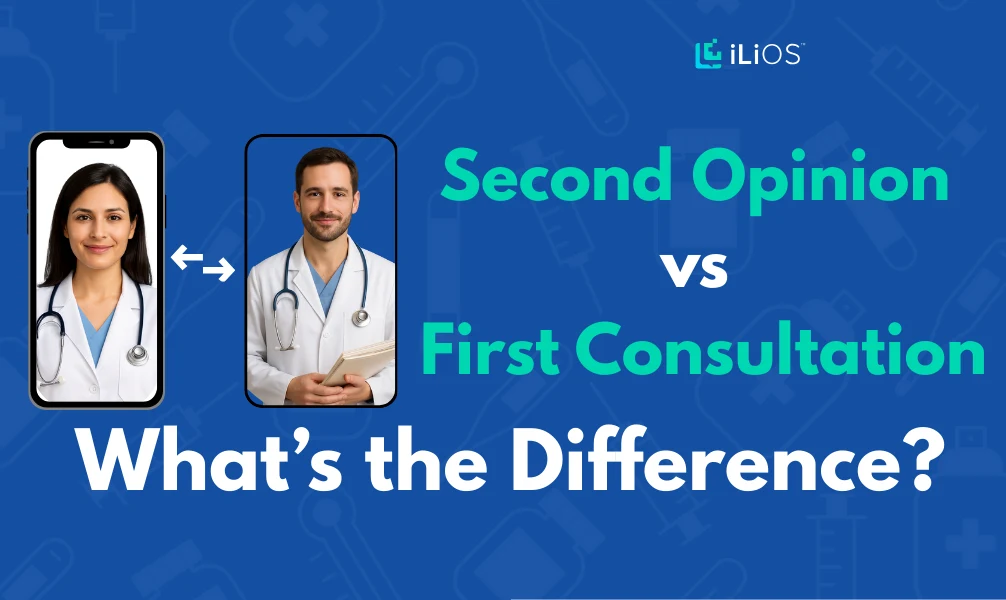When it is time to make adequate healthcare decisions, clarity and confidence play a crucial role! A lot of patients feel unsure about whether to have an initial consultation or get another opinion to confirm their diagnosis or treatment plan. Deciding between a second opinion vs first consultation involves more than just seeing a different doctor. It involves understanding where you are in the healthcare journey. First consultation helps in setting the foundation for your treatment, whereas a second opinion offers reassurance, an alternative perspective and uncovers a new pathway for treatment.
The difference between second opinion and first consultation includes purpose, timing and depth of medical discussion. First consultation prioritizes collecting medical history, identifying the patient’s symptoms and suggesting initial action for treatment. Meanwhile, the second opinion focuses on existing medical findings, providing a fresh assessment, cross-verification and taking a specialized outlook. Together, both aspects play an essential role in empowering patients to make accurate decisions at the right time for their well-being.
What is a Doctor’s First Consultation?
An initial medical consultation means the first meeting between a patient and a healthcare provider. The doctor gathers a lot of details about the patient’s health history, daily habits, current problems, and any other medical issues during this session. This session includes detailed questioning, reviewing medical records and in a few cases, physical examination to create a baseline determining their health.
During the initial consultation, patients have the opportunity to discuss their expectations, concerns, and treatment preferences. Doctors will usually recommend necessary diagnostic tests, medical advice, and give a detailed treatment plan according to the patient’s needs. It is more about resolving immediate health concerns, ensuring a clear understanding and guiding patients towards the proper daily care.
What is a Medical Second Opinion?
A medical second opinion is sought when a patient consults a different specialist or physician to discuss their initial medical advice or recommendations for a diagnosis plan. It allows patients to verify the first doctor’s opinion, explore other treatment options, and provide clarity before making any health decisions. This service is best utilized when the initial diagnosis is serious, is in support of a long-term treatment plan, is for an invasive procedure, or involves extended hospitalization, and will assure the patient fully understands other treatment options in the future.
When you compare a second medical opinion vs first consultation, the key lies in perspective and purpose. First consultation includes diagnosing the condition and suggesting an adequate treatment plan. Whereas, the second opinion prioritizes reviewing the initial treatment plan, validating previous diagnosis or providing necessary alternatives. Patients feel more confident when they understand the difference between getting a second opinion vs first consultation. This enables them to make better decisions, reducing the risk of incorrect diagnoses and unnecessary surgeries or treatments.
What is the Difference Between Second Opinion and First Consultation?
Whether you are facing severe illness or looking for an ideal solution for your well-being, determining the difference between second opinion and first consultation is vital. Both include seeking medical advice, but differ in dynamic purposes. The first consultation is an initial meeting with the doctor for diagnosis and treatment. On the other hand, a second opinion is pursued to confirm, compare, and re-evaluate the existing treatment plan for the patient’s betterment.
|
Factor |
First Consultation |
Second Opinion |
|
Purpose |
To recognize the patient’s health issue, conduct initial diagnostic tests, and suggest an ideal treatment plan. |
To confirm, question and explore alternatives to the first doctor’s diagnosis and treatment plan. |
|
Timing |
Beginning of seeking medical care. |
After receiving initial treatment or diagnosis recommendations from healthcare professionals. |
|
Doctor’s Role |
Gathers the patient’s information, makes rigorous evaluations, and recommends the next ideal steps. |
Reviews previous reports, offers expert advice and suggests alternatives for better treatment. |
|
Decision Making |
Enables setting the foundation for diagnosis and treatment. |
Patients can make cautious decisions about their treatment options or adjustments. |
When Should Patients Seek a Second Opinion?
Obtaining second opinions from physicians assists individuals in making better decisions about their healthcare. We often hear patients say that when they receive a difficult diagnosis or treatment plan during the initial appointment, they think about seeking another opinion. Understanding the difference between a second opinion vs first consultation gives patients a clearer idea of their next medical steps.
-
Complicated Diagnosis: If your provider has recently diagnosed you with a complex medical condition, a second opinion may give you a greater understanding of your condition and its treatment options. There is value in obtaining a detailed recommendation when the treatment involves risks or has ongoing ramifications.
-
Lack of Health Improvement: If your symptoms persist or worsen despite following the previous treatment plan, a second opinion can be beneficial for you. An alternative perspective can help you gain insights or explore alternative treatments for your well-being.
-
High-Risk Treatment Journey: When considering high-risk medical processes like surgery, patients must gain a second opinion from a specialist to make sure the process is accurate. This approach offers confidence and peace of mind to patients before they undergo an essential medical procedure.
-
Uncommon Condition: If you are diagnosed with a rare medical condition, patients need to consult specialists with expertise in a particular area. They can offer you guidance in terms of treatment and prognosis, providing adequate insights.
-
Uncertainty: If you have any uncertainty relating to your reports, treatment plan, or if you feel uncertain about your initial diagnosis, acquiring a second opinion may be a beneficial option. It will provide you with clarity and direction for the status of your medical condition and potential treatment options.
Final Takeaway!
Determining the difference between the second opinion vs first consultation is essential for making well-thought-out healthcare decisions. Your first consultation may provide you with a diagnosis and treatment plan.
In contrast, the second opinion provides you with both a concise overview and detailed knowledge about other treatment options that respect the situation of the patient. Contact the ilios Health team to request a second opinion easily regarding your condition!
FAQs
1. What is the main difference between a first consultation vs second opinion doctor?
The key difference the two related terms of medical consultation vs second opinion, is their purpose: the purpose of the first consultation is to meet the patient for the first time, and find a diagnosis, while the purpose of the second opinion is to provide another expert the ability to corroborate the first diagnosis, and then pursue other treatment options if required.
2. Can pursuing a second opinion change my initial treatment plan?
Yes, while it may confirm original advice, experts may suggest alternatives that are less risky or more effective for health.
3. How much time does it take to get a second medical opinion vs first consultation?
The first consultation may take longer because doctors need to take the patient’s medical history, discuss their health concerns, and conduct tests to identify the correct diagnosis. Whereas the second opinion prioritizes reviewing your existing reports and offering healthcare advice.




